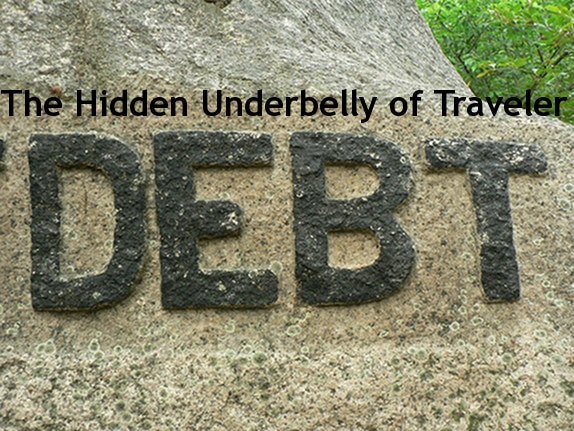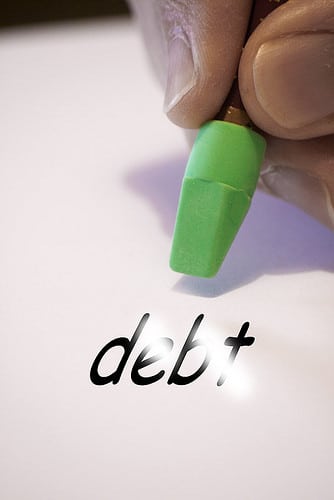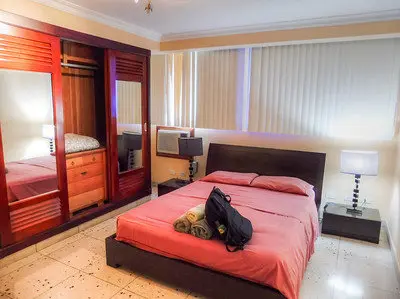It’s lurking out there, the aspect of financing your travels many travelers don’t talk about. Debt. Many travelers are funding their journey using debt in some form and racking up hefty bills to keep their trips going. Debt is the short path to traveling and the simplest way to get there is by credit card. It’s much more prevalent than you think and if you’re considering traveling in the long term you’ll do yourself a favor by avoiding the dark (or red) side.

The Easy Path
Credit essentially reduces the amount of time you have to wait to buy most things, including airline tickets. Traveling now in the long or short term is not worth paying off debt later. You can avoid the underbelly of debt by first off assessing your own financial situation and then doing something most travelers are good at – minimize.
- Overcome debt by hacking away the inessential.
 Reducing
Reducing
Many people who want to travel or follow a vagabond lifestyle are good at reducing and saving…at first. The more you cut back and save, the increased temptation you have to spend on other things. You’re saving now so why not buy a few tickets to Europe and just pay yourself back? Often you don’t end up paying yourself back and will still have a wonderful trip at that.
That’s where the troubles can begin.
More Travel Less Saving
As your travels increase the more you want to keep the momentum going and maintain the sense of freedom and exhilaration traveling can bring. The problem becomes almost a cycle, except that the debt actually keeps you grounded and makes it virtually impossible to leave the things that may tie you down. Funding your travels with more and more debt also can’t continue indefinitely.
First Thing’s First
Save for each of your trips before you take them so you don’t have to rely on plastic to pay for any part of them (you can’t payoff in time). Get real and add up the numbers, what are your total credit card balances?
- Don’t finance your travels with credit. Attack the credit card debts you have and knock them off, then you can work on your simple travel budget.
- Turn your skills into money, Elance is a great resource to look for freelancing projects.
- Learn some of the travel secret ways to save when you do travel.
- Try the free online tool BillShrink to efficiently hack away at those credit card payments.
- You can pay off $50,000 in debt with a 20K salary in 10 steps and 5 years.
Is It Really So Bad?
Having debt isn’t a necessarily bad thing, it only becomes troublesome when every time you travel the total amount increases and you take your next trip before whittling it down. Dumb Little Man has a good set of ways to maximize credit card reward programs and Bankaholic has a good set of tools to compare various rewards programs, interest rates, and more.
 But Life Is Short
But Life Is Short
There is the argument that life is short and with the future unknown, getting into a little bit of debt to see Thailand fox example, is a good trade. It seems as though younger travelers subscribe to this line of thinking more than middle-aged and older people. Take a look at your average life expectancy and consider that we live in the safest time in human history. Chances are you’ll live long enough to pay off your credit card balances.
Why The Traveler Debt Cycle Won’t Be Going Away
Human beings are poor assessors of risk, one of the reason why things like hotel terrorism plans are a waste of time. People in debt will still take trips because they find “a great deal” (there are always great deals somewhere and deals come back on everything) and will spend because they perceive they are saving.
The Taboo of Traveler Debt
I suspect there is much less saving going on among travelers than it seems or who at least use plastic as much as the general population (which varies quite a bit around the world). Debt is a big issue, the elephant in the room that isn’t talked about very much. Much of travel writing focuses on saving or getting a good deal – but what about if you’re already a few grand deep in credit card bills?

[photos by: iandavid, alancleaver_2000, MENE TEKEL]












Yikes, this was a problem I ran into on my last big trip. Credit cards are seductive, it’s hard to remember you are spending money you dont have. Last time around I was so eager NOT to come home that I just kept going until I maxed out. I don’t regret the times I had, but coming home with a big balance and no job was somewhat terrifying.
This time I will be paying everyting off before I leave and holding onto just one card in case of emergencies.
Using the credit card feels so good but at the same time bad. Somehow saving and saving for something then spending doesn’t feel as good but I think it’s because you don’t get the same instant gratification satisfaction.
I had a credit card years ago and racked up some hefty bills before finally putting it to rest sometime ago. Now I’m too scared of them to use one.
I was always glad that I had a credit card on me – but I always made sure that it got paid off immediately as soon as my next paycheck came in (since I was working along the way!) Had I traveled with all of the money in savings though, I guess it would be nice to travel w/out any card.
The credit card can offer some protection from theft on the road and most banks now offer bank cards that work as credit cards (except without the credit!) That’s what I use – seems when I have lots of cash on me that’s when I start spending.
Not only did I read this entire post with fascination, I read the posts on most of the links, since I am soon to head out for more long-term travel. I was particularly interested in the Elance comment – I just don’t seem to be able to “get it” with Elance. Maybe a subject for a future post???? How to navigate it and how to best get jobs.
Sure, I’ll put it on my list and schedule a post in about it. I’ve found it to be a great resource and there are many, many small jobs that can really take the ease off a budget.
This was a very relevant post for me as my wife and are are planning on relocating to Thailand and I have recently begun documenting that process on my blog. Debt + Travel is definitely a bad combination and right now we are foregoing all travel until we not only clear our debt, but also build a substantial relocation fund and portable income. If you’re interested in seeing the experiment (it will span the next several years) you can check it out here: http://www.thailandmusings.com/beginning-financial-transparency/
Hi Steve, that’s very similar to what I did at one point. I stopped spending and threw any extra money I had at eliminating my debt. Looking at your budget seems like most of your work income is portable – should go a much further way in Thailand. Thanks for the link, best of luck. I look forward to reading how it goes.
I’ve been fighting with the debt for about 3 years already and am almost credit card debt free. Should get rid of the last of it fairly quickly, depends on whether I focus on paying off the last card first or creating a cash emergency fund first. Either way, the current $10k debt seems much more manageable than where I started which was close to $60k in credit card debt. When I think of all the travel we could have done over the past 3 years instead of having to send all that money to the credit card companies it makes me feel sick.
We are leaving in 298 days for 3 years of travel, and we’ve revamped our lives in order to save enough money to do it. It has taken a while to pay off debt, downsize our lives, and make the day-to-day adjustments necessary to save the money and start living a leaner lifestyle, but it has been worth it.
When we leave, we won’t have much in the way of possessions, but we’ll have enough money to last us through a backpacking adventure well past our 40th birthdays. And we’ll still use credit cards for the protection they provide, but we’ll pay them off in full just like we’ve learned to do at home over the past few years.
Having traveled before on credit, I recommend the longer road of saving first. You’ll appreciate the trip more, rely on experiences rather than material things, and feel good about what you’re doing 100% of the time. Plus have a life to come back to, if that’s what you want.
Thanks for writing about this. We’ve been tackling this on our blog as well – everyone wants to travel, but no one seems to want to pay for it up front!
Hi Betsy,
Thank you for the wonderful comment. You’re right, it’s really a trade of time and matter of organizing spending. I’ll be sure to check out your ebook I saw on your site about your journey with saving. Here’s the link for everyone else interested as well:
http://www.marriedwithluggage.com/2009/12/03/how-we-saved-enough-money-to-change-our-lives-and-how-you-can-too-2/
Oh, this is perfect timing for me! I’m planning a RTW trip and I’m going to try my best to stay within a 20k budget which seems manageable according to lots of articles I’ve read. However, I’ll definitely keep a credit card on me for any emergencies.
But, I’m thinking that once I return from my trip is when I could come across the credit card debt problem. I’ll basically be exhausting most of my savings for this trip, so I’ll have to find a quick way to start making money again once I’m back. It seems some of your links should help me avoid that, so thanks! I’d love to try and freelance across the world—I’ll be interested to read your future post on Elance.
Hi Adam, as a graphic designer I think you’re in a good position to get work while you travel. I’d do what you can to make some money here and there so you don’t end up playing catch up when you return. I’ll start working on the eLance/freelance article which I hope you’ll find useful. I should have that up sometime in the next few weeks.
Thanks! Looking forward to it.
Great article. We agree, travel and debt don’t mix. Sure, you will be able to go away on credit, but the great experience that you just had will be tarnished when you come home and face a mountain of bills. Travel cheap and keep costs low at home and on the road. We are staying right now on a beach in Goa where right next door people are paying 50 Euros a night. We are staying in a simpler hut for 400 rupees. Less than 10 US dollars. We have the same beach, view and dinner options. We are just living for a fraction the price and paying cash.
In the 3rd world too seems there is always the very expensive option and then the local priced ones. I think some travelers shy away from paying less because they’re worried about less quality, etc.
I’m enjoying reading about your India travels btw, nice to hear you’re in the warmth of Goa. So many great places to stay, India is such a great place to travel.
Naive me. I had no idea long term travelers racked up such debt while on the road. I’m for earning it first, then paying your own way. But of course I’m a “geezer.” 🙂
Many times reduced spending takes the place of a good emergency or travel fund. I’m with you though, earn first spend after, guess that makes me a geezer too!
I don’t get how people can go into so much debt to travel. As seductive as travelling is, surely some self control needs to be part of the equation. I am surprised that basic budgeting and financial control isn’t part of the school curriculum (well, in Australia anyway = maybe it is in some other countries).
I’d be curious to hear where it might be a part of the education. I know in the US it’s not (for most counties). I think it’s a very important set of lessons that are very costly to learn first hand.
In Indian schools, they taught us (I studied in post-socialist times) that credit = stealing (= capitalist = bad). If you don’t have money right now, you have no right to spend it. 😉
I’m not sure about all of the lessons but I like the general thinking that not having the money upfront and using credit is a bad idea. Of course, it has its place, especially in bigger purchases and investments like homes, but many people find it tough to keep it under control.
Thankfully, I’ve been exposed to the “credit” culture only since last three years of living in Toronto. Before that, in my 25 years of living in India I knew less than a dozen people who had credit cards. LOL. Taking a debt to travel – that’s simply not going to happen to me, man!
Awesome! In the US, *everything* runs on credit…everything.